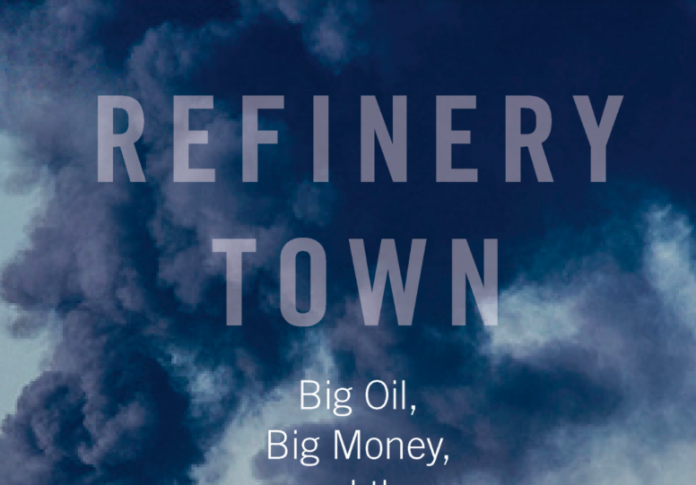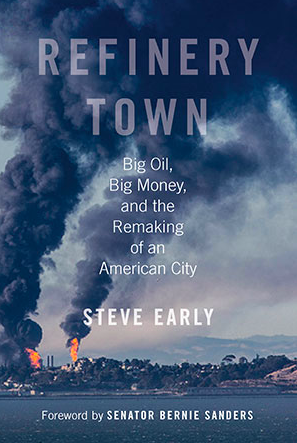
The pundit-defying results in Virginia’s recent elections happened because of “local, grassroots organizing,” according to Democratic leaders. An intensively researched saga, Steve Early’s Refinery Town: Big Oil, Big Money, and the Remaking of an American City is an impressive look at how activists in Richmond, California, figured out how to use the same kind of local clout—and also succeeded.

Early, a longtime journalist and labor organizer, moved from the Boston area to Point Richmond in 2012. In the book’s first chapter, he jokes that his realtor referred to his new home with its sweeping views of the Bay as the “Richmond Riviera.” But six months after the move, his wife was working outside when a panicked neighbor yelled, “Don’t you know there’s a ‘shelter in place’?” The Aug. 6, 2012 Chevron refinery fire was spewing toxic smoke and fumes across the skyline the couple had fallen in love with.
Early was already fascinated with Richmond’s “100-year history of refinery labor struggles and civil rights activity in the black community,” as he says, so the concept for “Refinery Town” easily emerged. But there were challenges. “Without bogging readers down in too much backstory, I had to distill two complex and overlapping threads that shed light on more recent Richmond controversies,” he says.
The result is a very dense, intense read. It draws readers back in time to tell the story of (then) Standard Oil’s establishment in Richmond, drawn by its natural deep-water harbor and the arrival of the Atchison, Topeka, and Santa Fe railroad, then moves forward through decades of environmental injustice, attempts at labor organizing, and overt racial discrimination to arrive at “The Greening of City Hall.”
As recently as 2003, Early reports, Richmond’s city government was rife with corruption and cronyism, and dominated by what is now Chevron and other industrial special interests. The author expertly delineates the multiple personalities, conflicts and events that led to the emergence of what became the Richmond Progressive Alliance (RPA), which, through the leadership of people like Juan Reardon, Andres Soto, and Gayle McLaughlin, began the uphill slog to transform Richmond and its politics.
Multifaceted battles over the proposed casino at Point Molate, the hiring of openly gay police chief Chris Magnus, and what Early calls “Tuesday Night Cage Fights” (City Council meetings) are all explored in narrative journalism style, allowing the reader access to passionate viewpoints on both sides.
Yet the most compelling section of “Refinery Town” is naturally its re-telling of Chevron’s now-infamous, unsuccessful attempt to buy Richmond’s 2014 elections in the chapter “An Election Not for Sale.” Before few had ever heard the term “fake news,” Chevron spent $3.1 million in negative advertising, direct mail, and “polling” calls, attempting to smear RPA candidates as anarchists and radicals. What happens when a pre-presidential-campaign Bernie Sanders comes to town really deserves a movie of its own. Early himself becomes a cast member, as he describes his encounters with larger-than-life characters such as former city council members Nat Bates and Corky Booze. (“Refinery Town” was submitted for publication prior to the 2016 city council elections, in which the RPA gained a majority for the first time.)
Early moves Richmond’s story further on, noting that the RPA itself has experienced internal controversies, resulting in reorganization, and in an ongoing split between it and former ally, current Mayor Tom Butt. He then turns to that inescapable Bay Area reality: “Gentrification and Its Discontents.” To those who still haven’t caught up with Oakland’s transformation, it may seem implausible that a place long known as crime-ridden and literally toxic could become “the Bay Area’s next hipster haven.” And the collapse of UCB’s plan to build an extension of the Lawrence Berkeley National Laboratory, closely documented by Early, has tamped down those rumors—for now.
Ultimately, Early is most interested in what Richmond’s struggles can teach other American “industry towns,” even those that don’t have large progressive elements.“I think organizers in any blue-collar, working-class community, whether predominantly white or majority minority, can learn a lot from the Richmond experience about making progressive politics a viable alternative to corporate domination,” he says.
And as for the refinery in “Refinery Town”?
“Chevron and Richmond could live happier ever after if the city’s damage suit against the company over the 2012 refinery fire was resolved more quickly,” Early says. “High-stakes litigation against the company just keeps piling up, with neighbors like San Francisco and Oakland, and several nearby counties filing lawsuits over Big Oil’s contribution to global warming, a case far more complex than determining liability for a single refinery fire.”
Refinery Town: Big Oil, Big Money, and the Remaking of an American City. Steve Early, author, forward by Sen. Bernie Sanders. Beacon Press, 2017, 194 pages, $27.95.

